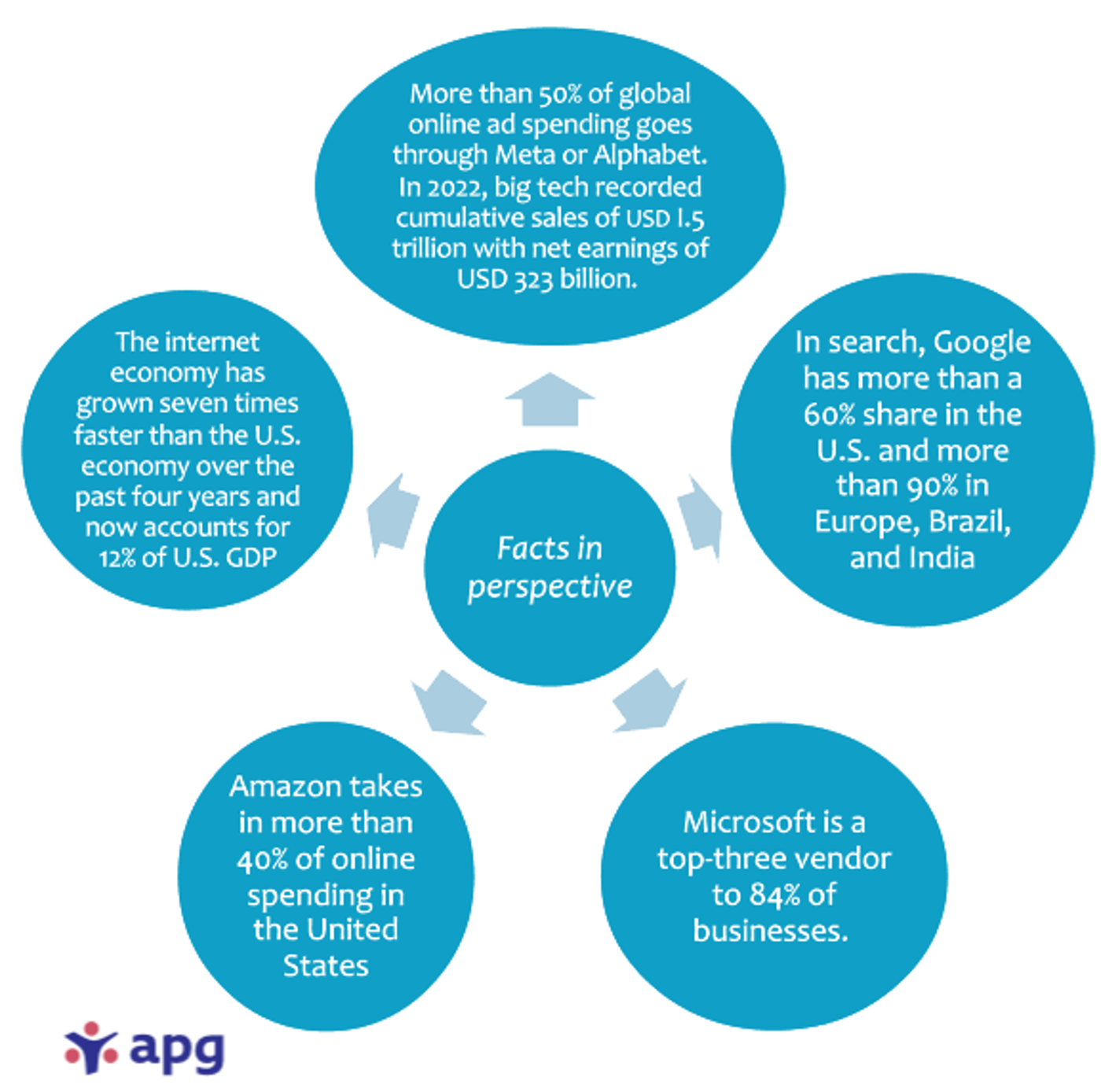Engaging with the major players that dominate tech innovation can be challenging due to the ever-evolving digital landscape. The products they develop affect billions of people in countries with starkly different levels of governance and control. Senior Responsible Investment Manager Simone Andrews talks about the results of APG’s engagement program with highly influential companies like Alphabet and Microsoft. A conversation about the role large investors can play in encouraging them to focus on the serious human rights risks.
Tech was not seen to be an area with serious environmental and social issues before around 2016 when the first US electoral manipulation scandals flared up and people became increasingly aware of how personal data could be misused. APG started engaging with the sector on behalf of its pension fund clients around this time. Andrews: “In the early days, our emphasis was on whether companies had human-rights and digital policies in place to ensure trust and user consent. But in the second phase of our engagement in 2021 and 2022, our clients shifted their emphasis to how these policies have been implemented and how effective they have been.”
A complicated and diverse engagement theme
The companies at the forefront of the digital revolution are global household names. They provide cheap or free inter-connectivity, low-cost access to market and reduce IT hardware and infrastructure costs. “They have a huge, diverse and loyal customer base and play a key role in people’s lives enabling them to sift information, socialize and purchase merchandise. The nature of their products and services allows a potential degree of influence on minds and behaviors on an unprecedented scale,” explains Andrews. “Speed of change is a further complicating factor as services and platforms can evolve incredibly quickly, often before the ethical implications can be properly assessed, leaving regulators constantly having to play catch up.”
Prioritizing objectives
“In order to enable us to better evaluate our engagements and the progress we make; we focus on four main topics. The first of these is Privacy and Security. Our expectations here are based on the principle that users should be at least co-owners of data they generate with control over how and if information is shared, retained or transferred. We want to see how companies achieve this in practice.”
According to Andrews, Responsible AI is a much newer area where ethical standards for development and deployment are still evolving. “We encourage companies to adopt a clear approach, with AI-based policies that center human rights. A good example is how machine learning algorithms can help make decisions – they speed up how data is analyzed and make useful predictions. But on the flipside are the potential biases, for example, in facial recognition technology used in surveillance applications that have widespread ethical implications.”
The third topic is Content Shaping and Moderation. Andrews emphasizes the benefits of social media, but also the fact that business models mean that companies have to generate ad revenue. “Shaping content helps keep users on the platform longer but can cause hate amplification, exacerbate polarization and spread disinformation. Tackling (moderating) content that violates a platform’s policies or contravenes the law, can also create dilemmas – at what point does it impact freedom of expression? That said, companies can actively determine the information they elevate and take more responsibility to protect vulnerable users. This is something we have advocated in our dialog over the last two years.”
“Finally, we talk to companies about their Lobbying activities,” explains Andrews. “If they appear to stimulate policies that support users’ rights and privacy but do not back or even actively work against legislation to beef up controls in this area, we flag this. We also look at how they respond to industry-wide efforts and handle the interests of other stakeholders.”
Talking to the tech giants
“Together with our portfolio managers, we talked to the five tech giants – Alphabet (Google), Amazon, Apple, Meta (Facebook) and Microsoft. As they are spearheading digital innovation, this was a logical place to start – by trying to set industry standards from the top down,” says Andrews. These companies have complex governance structures, in some cases concentrated share ownership, and wield considerable power. The data in the visual below highlights their dominance. “As a large investor, they usually respond to our request for dialog, but the degree of contact varies considerably, from attending investor meetings with little interaction to discussing specific topics with company specialists. That said, after last year’s market wobble and increasing public scrutiny, companies are more receptive to entering into a dialog with investors.”




